Placing Children in Families, A Top Priority
As at September, 2012, some 57.5 per cent of children in State care were in Living in Family Environment (LIFE) Programmes which are alternatives to placing children in child care facilities.
CEO of the Child Development Agency Carla Francis Edie said the Agency is on an intense drive to increase the number of children in LIFE programmes this year.
LIFE programmes include foster care, family reintegration, and Supervision Orders. Of the over 5200 children in State care, 2219 are in children’s homes and places of safety. A little over 3000 are in LIFE programmes – 985 in foster care; 802 on family reintegration, and 1220 on Supervision Order. Separate from those figures, some 141 adoptions were completed between January and September 2012.
These programmes are designed to allow children who are in need of care and protection to live in a home environment to support their positive growth and development, thereby reducing the number of children in child care facilities.
“When children come into residential care, we provide them with a range of services – health; education, psychological support and other specialized services as required. Yet our goal is to reserve residential care (institutionalisation) for only those children who have nowhere else to go because they have no family or other forms of support” Mrs. Edie said.
Foster care is a flagship programme within the Agency that places a child (temporarily) in the care of persons who are not the biological parents to enable them to raise that child and provide a nurturing environment for his or her physical, spiritual and emotional growth and development.
With respect to adoption, Mrs. Edie added this is the legal process of permanently transferring the parental rights of a child’s biological parents (with consent) to one who is desirous of creating a new parent/child relationship.
Family Reintegration is reuniting and rehabilitating a child and his/her family, after a period of being in a child care facility or foster care, Mrs. Edie said, adding that under a Supervision Order, the Court issues an order for a child in need of care and protection to be placed with a family member under the supervision of a CDA Children’s Officer.
“Our experience has shown that children do better in a home/family setting, rather than being institutionalized; children who are placed in families do better on all counts – in education and as it relates to other areas of their lives,” Mrs. Edie said.
This is why we are redoubling our efforts to increase the number of children in the LIFE programmes “ Mrs. Explained.
“The agency’s thrust is also in keeping with one of the key principles of the Child Care and Protection Act (CCPA) which indicates that the family is the preferred environment for the care and upbringing of children,” Mrs. Edie said.
In the meantime, the CEO acknowledged that steps were being taken to make a number of these programme, in particular, foster care and adoption, more efficient. The Adoption Act is being modernised, and a review of the current legislation is to get underway. Also, last year, the Agency held a training workshop for officers in an effort to improve the internal processes for adoption.
As it relates to foster care, CDA has been working with the relevant authority to have the stipend paid to foster parents increased. The stipend is provided to foster parents in addition to educational, medical and other forms of assistance.
“We want to use these various programmes to help give our children the opportunity to be part of families that can nurture them to realize their full potential,” Mrs. Edie stated, adding, “I would also like to use this opportunity to encourage persons to become foster parents.”
Contact: Prudence N. Barnes
Tel: 967-5905
Email: barnesp@cda.gov.jm
Twitter: @cdajm
Facebook: www.facebook.com/child-development-Agency
Website: www.cda.gov.jm
